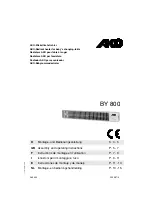
Do this as follows (see fig. 1a):
• Unscrew the self-tapping screws and remove the following
elements:
• The cover plate at the back on the right, (1).
• The cover plate at the back/side, in the left-hand corner, (2).
• The square-corrugated steel plate on the left-hand side, (3).
• The side piece on the left of the combustion chamber, (4).
• Place the magnets.These should be positioned at the side
on the left and at the front on the right.
• Replace the following elements with the self-tapping screws.
• The side piece on the right of the combustion chamber, (4).
• The square-corrugated steel plate on the right-hand side, (3).
• The cover on the back/side, right-hand corner, (2).
• The cover plate at the back, on the left, (1).
If you have bought a front for an interior with a window on
the right, and the interior has been assembled with a
window on the left, the interior will first have to be
converted, as above but then the exact opposite.
Fit the receiver tray (8) to the cover on the back/side (2),
see fig.1a and c.
Saxo SL
To do this:
• Remove the screws from the retaining strip at the front.
• Remove the strip and then the front pane.
• Remove the screws at the sides of the retaining strips.
• Remove the strips and then the side panes.
Now move the appliance into the required position.
It must not be allowed to stand on a solid plate without
the feet. If the heater is to be installed without the feet, it
must stand on a plate with holes in it for ventilation
purposes. Otherwise the gas control block and the
receiver will get far too hot.
Now position the chimney breast as required, allowing
enough space around the heater for the heat to escape.
To ensure a good heat supply and discharge, the chimney
breast must be adequately vented. Once it is in position, fix
the appliance to the wall with the wall brackets (5) and
two expanding shells provided, (see fig. 1). Connect the
appliance.The appliance is supplied with the ignition cable
coiled. Decoil the cable after installation to prevent leakage
of the voltage, thus preventing poor ignition.
NB:
To ensure the ignition works properly, the ignition
wire must come into as little contact as possible with the
metal parts of the heater and should therefore not be
wound round the gas or pilot-light pipes or the
thermocouple.
Build a chimney breast as shown in fig. 2.
Fig. 2a is for a mounted chimney breast and fig. 2b for a
built-in chimney breast, depending on whether you have a
window on the left or right.
LUX vent component
To ensure a good heat supply and discharge, the chimney
breast must be adequately vented. A vent component, the
LUX vent component, is available from your installer.The
vent component serves to ventilate the chimney breast.
English
Saxo
INSTRUCTIONS FOR INSTALLATION
19
38C-1071
5
1
2
3
4
7
8
6
9
9
9
fig. 1a
38c-1094
2
8
fig. 1c
Summary of Contents for SAXO
Page 50: ...ALLGEMEINE BEMERKUNGEN MIT BRIEFUMSCHLAG VERSENDEN IHREN INSTALLATEUR...
Page 70: ...66...
Page 71: ...Saxo 67...
Page 72: ......
















































